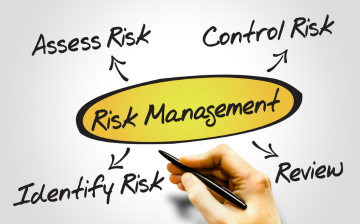
Best Risk Management Course in India 2025
Best Risk Management Course in India 2025
India’s risk management industry is projected to grow at a CAGR of 15.2%, rising from USD 446 million in 2024 to USD 1,642 million by 2033. This steady expansion reflects the growing importance of structured risk governance and the rising demand for qualified specialists.
The risk talent market in India is growing rapidly. Banks, insurers, fintechs, large corporations, and consulting firms are all seeking professionals who can identify, measure, and mitigate financial, operational, cyber, and ESG risks. Choosing the right risk management course is crucial for anyone planning a career in this expanding domain.
This guide explains what to look for in a programme, highlights top courses for 2025, and answers common questions from aspiring students.
What Should a Good Risk Management Course Offer?
A strong programme must blend theoretical knowledge with practical experience. Look for courses that include:
- Core areas such as market, credit, operational, IT, cyber, and ESG risk
- Scenario modelling and applied analytics
- Case studies or live projects with placement or internship opportunities
- Recognised academic or industry affiliations to enhance the course’s credibility
Such features prepare students for real-world challenges and make classroom learning relevant. This is particularly important for postgraduate diplomas or professional certificate courses in risk management.
The Securities and Exchange Board of India (SEBI) mandates top listed companies to form Risk Management Committees (RMCs). As SEBI plans to extend this rule to more organisations, the demand for skilled risk professionals will continue to rise.
Top Risk Management Courses and Institutions in India (2025)
1. Global Risk Management Institute (GRMI), Gurugram – Post Graduate Diploma in Risk Management (PGDRM)
GRMI offers a one-year, full-time Post Graduate Diploma in Risk Management (PGDRM). The course covers diverse domains including financial risk, operational risk, IT and cyber risk, enterprise risk management (ERM), ESG, and applied analytics.
One of GRMI’s strengths is its guaranteed internship programme. Students receive exposure through practical projects, case studies, and mentorship from industry experts. The institute also highlights international endorsements and global recognition, enhancing the value of its diploma.
2. National Insurance Academy (NIA), Pune
The National Insurance Academy (NIA) offers specialised diplomas and certification programmes focused on enterprise and insurance risk. These short-term diplomas and practitioner workshops cater to students and professionals in underwriting, reinsurance, and insurance risk management.
3. Short Certifications and Professional Bodies (ERM Focus)
The Institute of Risk Management (IRM), which has an India affiliate, provides globally recognised Enterprise Risk Management (ERM) qualifications. These modular certifications are ideal for professionals who wish to specialise in governance, risk frameworks, and enterprise resilience.
Aligning Courses with Career Goals
Selecting the right programme depends on your career aspirations and availability.
A risk management diploma, such as GRMI’s PGDRM, is ideal for graduates seeking an intensive one-year course that provides classroom learning and internship exposure. This path prepares students for junior or mid-level roles in risk analysis across industries.
If you already work in the insurance or BFSI sector or wish to explore actuarial science, courses from NIA and IIRM offer valuable industry exposure and professional connections.
Short-term risk management certificate courses and ERM qualifications from organisations like IRM India are suited for working professionals who want to upgrade skills without leaving their current roles.
Why Choose PGDRM or GRMI?
A Post Graduate Diploma in Risk Management (PGDRM) provides multi-disciplinary training across financial, operational, and technology risks. The GRMI curriculum balances academic rigour with practical relevance through case studies, simulations, and real-world applications.
GRMI’s PGDRM programme focuses strongly on internship placements, international recognition, and industry mentorship. For graduates who prefer structured, job-oriented study aligned with 2025’s career trends, the PGDRM is an excellent choice.
Careers and Salary Expectations
Graduates of one-year risk diplomas often begin their careers in roles such as:
- Risk Analyst (credit, market, or operational)
- Third-Party Risk Analyst
- Compliance Analyst
- Junior Cyber Risk Analyst
Salary levels depend on industry and job location. Roles in investment banking or large financial institutions tend to offer higher pay than compliance-focused positions. According to industry data, entry-level risk analysts in major cities can earn ₹5–8 LPA, while experienced professionals may reach ₹12–15 LPA within a few years.
The growing regulatory focus and digital transformation in India’s financial ecosystem are expected to create thousands of new roles in enterprise and technology risk management by 2026.
Final Thoughts
A career in risk management combines analytical skills, business understanding, and regulatory awareness. For those seeking structured learning with job placement opportunities, the PGDRM and similar one-year diplomas provide an ideal foundation.
If you want to specialise in technology risk, consider courses such as PGDTRM or equivalent certifications. Always review the latest prospectus, placement data, and alumni feedback before enrolling.
Institutions like GRMI offer detailed information about modules, internship partnerships, and learning outcomes on their official websites. Choosing a risk management course that aligns with your long-term career goals is key to standing out in the competitive job market.
FAQ’s
Q1: What is the typical duration of a PGDRM course?
Ans: Most full-time PGDRM diplomas last one year. Some programmes extend to two years, depending on structure and internship duration. GRMI offers a one-year on-campus PGDRM course.
Q2: Is a diploma better than a short certificate?
Ans: A one-year diploma provides comprehensive training and improves placement chances. Short certificates are ideal for professionals seeking quick upskilling without leaving their jobs.
Q3: When should one choose PGDTRM instead of PGDRM?
Ans: Select a technology-focused diploma if you aim for roles in IT risk, cyber risk, cloud security, or vendor risk management. The NU–GRMI PGDTRM is designed for such positions.
Q4 Do institute affiliations and international endorsements matter?
Ans: Yes. Recognised affiliations enhance the diploma’s credibility and may enable international credit transfers or equivalence under global frameworks. Always check the institute’s website for endorsement details.
You may also like

Which careers are truly safe from layoffs in 2026?

What Are the 3 Types of Credit Risk?


